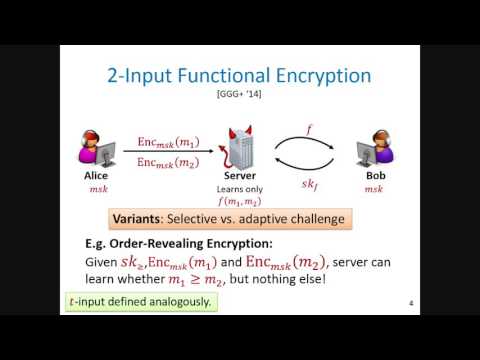Welcome to the resource topic for 2015/158
Title:
Multi-Input Functional Encryption in the Private-Key Setting: Stronger Security from Weaker Assumptions
Authors: Zvika Brakerski, Ilan Komargodski, Gil Segev
Abstract:We construct a general-purpose multi-input functional encryption scheme in the private-key setting. Namely, we construct a scheme where a functional key corresponding to a function f enables a user holding encryptions of x_1, \ldots, x_t to compute f(x_1, \ldots, x_t) but nothing else. This is achieved starting from any general-purpose private-key single-input scheme (without any additional assumptions), and is proven to be adaptively secure for any constant number of inputs t. Moreover, it can be extended to a super-constant number of inputs assuming that the underlying single-input scheme is sub-exponentially secure. Instantiating our construction with existing single-input schemes, we obtain multi-input schemes that are based on a variety of assumptions (such as indistinguishability obfuscation, multilinear maps, learning with errors, and even one-way functions), offering various trade-offs between security and efficiency. Previous and concurrent constructions of multi-input functional encryption schemes either rely on stronger assumptions and provided weaker security guarantees (Goldwasser et al. [EUROCRYPT '14], and Ananth and Jain [CRYPTO '15]), or relied on multilinear maps and could be proven secure only in an idealized generic model (Boneh et al. [EUROCRYPT '15]). In comparison, we present a general transformation that simultaneously relies on weaker assumptions and guarantees stronger security.
ePrint: https://eprint.iacr.org/2015/158
Talk: https://www.youtube.com/watch?v=qDMtFAyTx2c
See all topics related to this paper.
Feel free to post resources that are related to this paper below.
Example resources include: implementations, explanation materials, talks, slides, links to previous discussions on other websites.
For more information, see the rules for Resource Topics .
